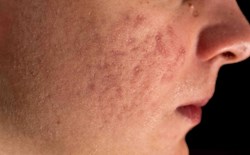“So the best advice we can give folks who have acne, is to be patient and let the medications work and get to our office immediately so we can calm down your skin before it becomes overwhelming!”
Las Vegas, Nevada (PRWEB) September 30, 2013
According to Wikipedia, we now have over 17 million acne sufferers, costing our health care system $1 billion a year. Eighty to ninety percent of teenagers suffer acne to varying degrees.
Acne is a human skin condition that occurs when hair follicles become plugged with oil and dead skin cells, characterized by areas of skin with seborrhea (scaly red skin), comedones (blackheads and whiteheads), papules (pinheads), nodules (large papules), pimples, and possibly scarring. Acne affects mostly skin with the densest population of sebaceous follicles; these areas include the face, the upper part of the chest, and the back. Acne can be distressing and annoyingly persistent. Acne lesions heal slowly, and when one begins to resolve, others seem to crop up.
Depending on its severity, acne can cause emotional distress and lead to scarring of the skin. The good news is that effective treatments are available — and the earlier treatment is started, the lower the is risk of lasting physical and emotional damage.
According to Dr. F. Victor Rueckl, a dermatologist in Las Vegas, Nevada, acne occurs most commonly during adolescence, but often continues into adulthood. Additionally, a rise in adults who didn’t ever suffer from adolescent acne has been increasing in the last decade. In adolescence, acne is usually caused by an increase in testosterone, which accrues during puberty, regardless of sex. For most people, acne diminishes over time and tends to disappear — or at the very least decreases — by age 25.[a] There is, however, no way to predict how long it will take to disappear entirely, and some individuals will battle acne their entire lives if they don’t pursue proper treatments.
Dr. F. Victor Rueckl of Lakes Dermatology said, “I’ve been treating acne during my entire career. The one common factor in those who fail to resolve the acne is that they quite simply did not stay on the treatment long enough. Patients often become discouraged when they see another eruption while they are taking the drugs and following the protocol.” He added, “Patience and persistence are keys in the treatment of acne.”
Recently, Dr. Rueckl began treating post-acne discoloration and scarring with a new treatment called Invasix Fractora. He stated, “We have had dramatic results in ridding people of acne scarring and discoloration by using a machine we have in our office called Invasix Fractora. We have seen some truly radical improvement. The problem with Fractora is that you need to start with a fairly clear face to begin with, and too many people come to me trying to treat scarring before they’ve even treated the active outbreaks. This isn’t possible. We need to get rid of the outbreaks and active acne before ever trying to address scarring and redness.” He went on to state that, “After an acne regimen and getting control of new acne, many people are left with redness and post inflammatory hyperpigmentation. If that patient doesn’t have scarring, they can be treated with light IPL treatments or Cutera Laser Genesis to rid the skin of the reds and browns often left behind by acne lesions.”
Katie Rueckl, office manager of the Lakes Dermatology practice said, “The bottom line with acne is that a product like ProActiv works for a while, but once the patient’s skin becomes accustomed to the benzoyl peroxide, the acne returns. Of course diet and good skincare play an integral part of success. We have found if you discover acne, treat it immediately. Don’t wait for a major outbreak to occur. We can achieve much better results when we are allowed to see patients early on.”
Aside from scarring, acne’s main effects are psychological, such as reduced self-esteem[b] and in very extreme cases, depression or suicide.[c] Acne usually appears during adolescence, when people already tend to be most socially insecure. Early and aggressive treatment is therefore advocated by some to lessen the overall long-term impact to individuals.
“So the best advice we can give folks who have acne is to be patient and let the medications work and get to our office immediately so we can calm down your skin before it becomes overwhelming,” Rueckl concluded.
If you have acne and will be in the Las Vegas area, be sure to set up an appointment to understand your options. Lakes Dermatology 702-868-6667
References:
[a] Arndt, Hsu, Kenneth, Jeffrey (2007). Manual of dermatologic therapeutics. Lippincott Williams & Wilkins. ISBN 0-7817-6058-5.
[b] Goodman G (July 2006). “Acne and acne scarring – the case for active and early intervention” (PDF). Aust Fam Physician 35 (7): 503–4. ISSN 0300-8495. PMID 16820822
[c] Purvis D, Robinson E, Merry S, Watson P (December 2006). “Acne, anxiety, depression and suicide in teenagers: a cross-sectional survey of New Zealand secondary school students”. J Paediatr Child Health 42 (12): 793–6. doi:10.1111/j.1440-1754.2006.00979.x. ISSN 1034-4810. PMID 17096715.
One study has estimated the incidence of suicidal ideation in patients with acne as 7.1%:
*Picardi A, Mazzotti E, Pasquini P (March 2006). “Prevalence and correlates of suicidal ideation among patients with skin disease”. J Am Acad Dermatol 54 (3): 420–6. doi:10.1016/j.jaad.2005.11.1103. ISSN 0190-9622. PMID



